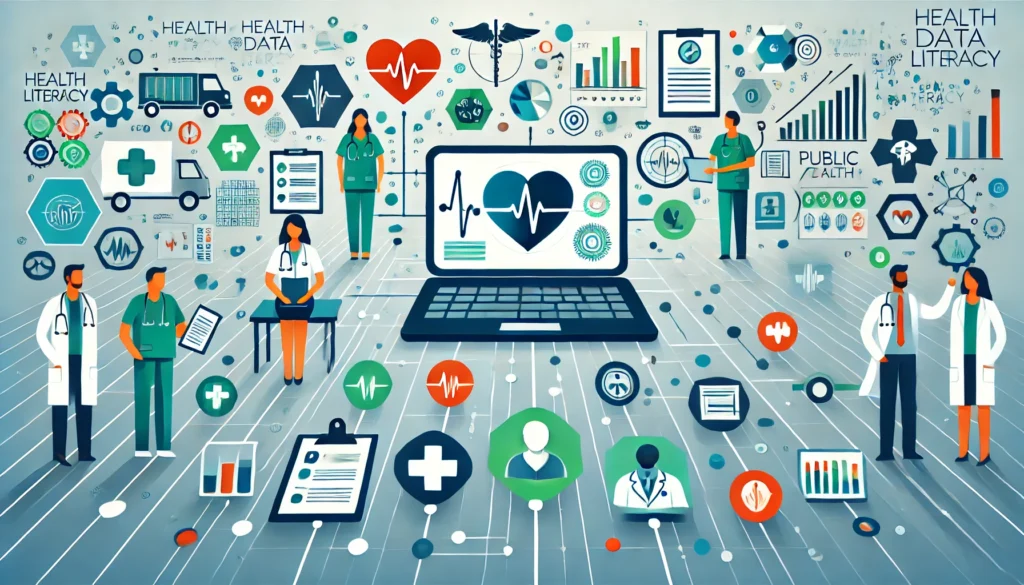In an increasingly digital world, health data is transforming how we understand and improve health outcomes. But with this transformation comes a challenge: how do we ensure that everyone—patients, healthcare providers, policymakers, and the public—has the knowledge and skills to make sense of health data? This is where health data literacy becomes essential.
The recent Healthy Data Collective webinar highlighted why improving health data literacy is crucial for building a resilient, equitable, and efficient health system.
What is Health Data Literacy?
At its core, health data literacy is the ability to understand, interpret, and use health data effectively. This includes:
Understanding Key Terms: Recognizing concepts like interoperability, patient portals, and health data standards.
Interpreting Data: Knowing how to read and interpret statistics, charts, and other data presentations.
Making Decisions: Using health data to make informed decisions about personal health, public health policies, or healthcare delivery.
Why is Health Data Literacy Important?
The webinar underscored several reasons why health data literacy is vital:
1. Empowering Individuals: Patients who understand their health data can make better decisions about their care, improving outcomes and fostering trust in the healthcare system.
2. Guiding Policy and Innovation: Policymakers with strong health data literacy can craft evidence-based policies and embrace new technologies to meet the evolving needs of the health system.
3. Adapting to New Technologies: Emerging technologies like artificial intelligence, machine learning, and advanced analytics rely on data. A public well-versed in health data literacy can engage more effectively in discussions about the ethical and equitable use of these innovations.
4. Strengthening Public Health: Informed communities can better understand public health data, such as pandemic metrics or vaccination rates, enabling them to participate in collective health actions.
How Can We Improve Health Data Literacy?
Improving health data literacy requires a multi-faceted approach:
1. Education and Training: Integrate health data concepts into school curriculums, professional training programs, and community workshops.
2. Simplified Resources: Develop accessible tools and platforms, like MyPathologyReport.ca or MyHealthDataPath.ca, to help individuals navigate and interpret their health data.
3. Public Awareness Campaigns: Launch campaigns to demystify health data and emphasize its importance for personal and public health decisions.
4. Supportive Policies: Encourage governments to prioritize health data literacy as a foundational element of health system reform, ensuring everyone can benefit from new technologies.
The Importance of Health Data Literacy for the Public
The webinar placed particular emphasis on the role of health data literacy for the public in shaping the future of healthcare. As new technologies emerge, they will transform the health system in ways we can’t yet fully predict. A public equipped to understand and question how health data is used will:
Ensure Equity: Advocate for data practices that benefit all populations, particularly those traditionally marginalized in health systems.
Promote Accountability: Hold policymakers and organizations accountable for ethical, transparent, and effective use of health data.
Drive Innovation: Support the adoption of technologies that improve care in a way that meets the needs and expectations of the public while safeguarding privacy and security.
Building a Healthier Future Together
Health data literacy isn’t just a skill; it’s a cornerstone of a healthier, more equitable future. By fostering greater understanding and engagement with health data, we can ensure that new technologies and policies reflect the values and needs of the people they are meant to serve. It’s also not a “one-and-done” type activity. As the health system continues to evolve, so will the content and concepts of health data literacy.
If you missed the webinar, check it out here to explore how health data literacy is shaping the evolution of our health system.
Let’s work together to make health data a tool for empowerment and innovation—for everyone.


